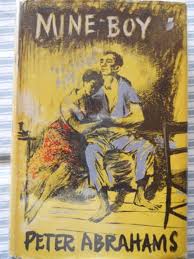The importance of this early novel from any black or coloured
African in the pantheon of African literature can not be over emphasized. Pa
Abrahams who sadly died this year after glimpsing becoming a Centenarian was a
very good perceptive writer with sensitivity.
Despite growing up in the hell of a racist enclave – where
blacks were considered very inferior - he always managed to write from the
“human” point of view with restraint and civility and great intelligence. This
is obvious in this work as we zero in on Xuma and his metamorphosis into a man
and thinker over the years. From a very simple, naïve country bumpkin he
attains awareness late on in a way that would strike clanging chords among all
readers…as it did over the decades, with the world realizing how “apartheid’
was a horrific, unbearable thing in South Africa.
And the work is a fine read too, right from the beginning as
Xuma arrives at Malay camp, gets to mix with a medley of people…he gets a job
in the Mines and is struck with the way the life of whites – with their many
comforts and appurtenants – contrasts sordidly with the life of blacks. Why
should whites be free and drink liberally whilst blacks were constrained to
carry passes in the land of their birth? And also arrested for selling and drinking
“local drink”?
Leah, the powerful
‘Skokiaan queen’ is a splendid woman and somewhat takes the naïve Xuma under
her wing. His initial naivety is charming, and his great strength very
impressive too. Life would have been fairly okay if not for all the constrictive
structures of racism in society. The descriptions are beguiling and
unforgettable here, including the colourful weekends in the townships! Hark at
the dancing sequences, coquetry, flirting and drinking.
Xuma himself is not celibate as the story unfolds, and he is
very much entranced and “in love” with Eliza who is presented as beautiful; but
conflicted and eccentric as she “craves for the fine things of the whites”
which she can never have. It is a haunting, somber aspect and we are happy for
Xuma as things initially go well between him and Eliza - till she disappears!
Eliza has gone…Yet the other woman, Maisy, is always there for Xuma and
understands him and handles her own frustration with extraordinary selflessness
and maturity.
Xuma begins to think about things, and the irony is that it
is a white man, Paddy, who conscientizes him and lets him fully realize that
one should not believe in racial superiority or otherwise, and the “good things
of life” should be for everybody, not only whites. That all men should be free
and equal. If only it were so…the whole idea grips Xuma and he begins to think
along these lines…man as man, never mind colour or race…goodness and fairness
and freedom!
It is the making of
Xuma, as a series of undesirable and tragic events unfold in the last part of
the work. Xuma leads a rebellion in the mines at the end and is none the worse
for it,; he is ready to settle down with Maisy at last (once he has left jail).
This is grim and halcyon at the same time. A wonderful work indeed.
- Malome Eric


No comments:
Post a Comment